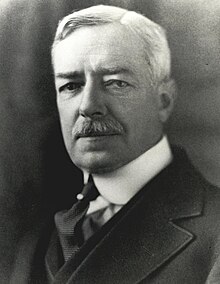Robert Lansing | |
|---|---|
 | |
| 42nd United States Secretary of State | |
| In office June 24, 1915 – February 13, 1920 Acting: June 9 – 24, 1915 | |
| President | Woodrow Wilson |
| Preceded by | William Jennings Bryan |
| Succeeded by | Bainbridge Colby |
| 3rd Counselor of the United States Department of State | |
| In office April 1, 1914 – June 23, 1915 | |
| President | Woodrow Wilson |
| Preceded by | John Bassett Moore |
| Succeeded by | Frank Polk |
| Personal details | |
| Born | October 17, 1864 Watertown, New York, U.S. |
| Died | October 30, 1928 (aged 64) New York City, U.S. |
| Political party | Democratic |
| Spouse | Eleanor Foster (1890–1928) |
| Education | Amherst College (BA) |
Robert Lansing (/ˈlænsɪŋ/; October 17, 1864 – October 30, 1928) was an American lawyer and diplomat who served as Counselor to the State Department at the outbreak of World War I, and then as United States Secretary of State under President Woodrow Wilson from 1915 to 1920. A conservative pro-business Democrat, he was a strong advocate of democracy and of the United States' role in establishing international law. He was an avowed enemy of German autocracy and Russian Bolshevism.[1] Before U.S. involvement in the war, Lansing vigorously advocated freedom of the seas and the rights of neutral nations. He later advocated U.S. participation in World War I, negotiated the Lansing–Ishii Agreement with Japan in 1917 and was a member of the American Commission to Negotiate Peace at Paris in 1919. However, Wilson made Colonel House his chief foreign policy advisor because Lansing privately opposed much of the Treaty of Versailles and was skeptical of the Wilsonian principle of self-determination.
- ^ David Glaser (2015). Robert Lansing:A Study in Statecraft. Xlibris Corporation. pp. 1–3. ISBN 9781503545014.